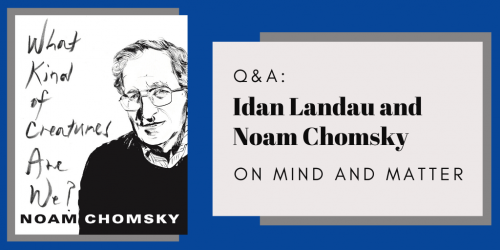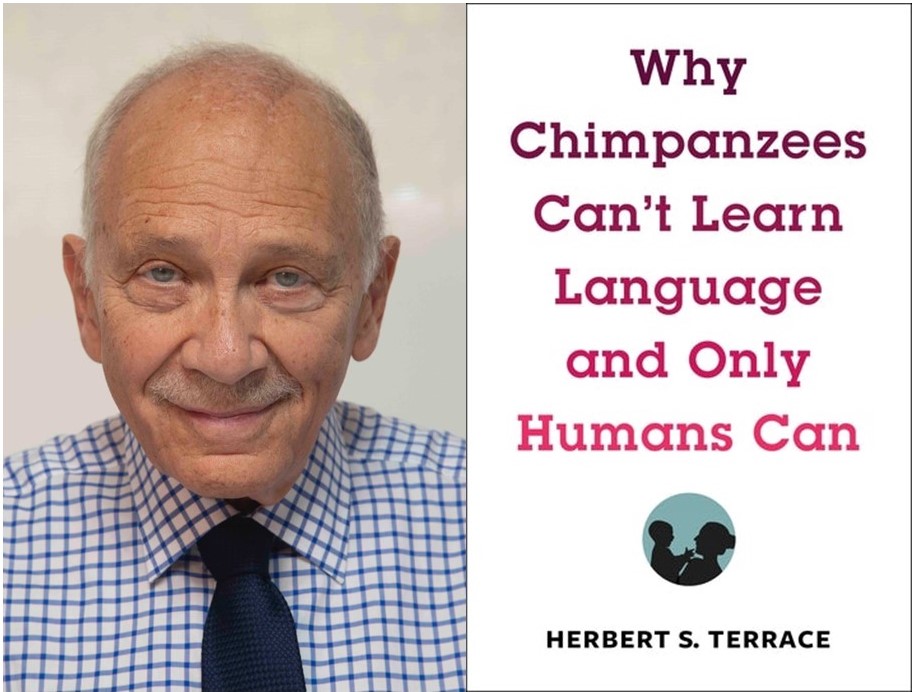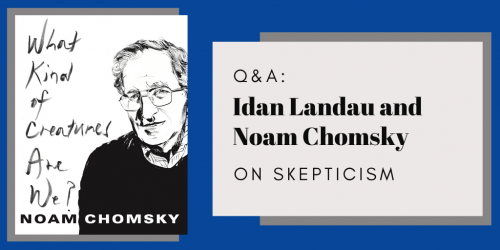Q&A: Idan Landau and Noam Chomsky on Anarchism on the Ground

“Noam Chomsky launches this remarkable discussion with the age old question, “What kind of creatures are we?” Thus begins an extended inquiry into human cognition that takes him from the ancients to contemporary theorists of language and science, to politics.”
Frances Fox Piven, Distinguished Professor of Political Science, Graduate Center of the City University of New York
The interview between Noam Chomsky, author of What Kind of Creatures Are We?, and Idan Landau, professor of linguistics at Ben Gurion University, Israel, continues today with a discussion about anarchism. Come back tomorrow to read about language design.
• • • • • •
Idan Landau: Most liberals would scoff at what they perceive as the naiveté of Rudolph Rocker’s ideas. Yet anarchist ideas constantly feed social movements and are sometimes even put to practice. The most impressive anarchist experiment of the last decade, to my mind, is the autonomy of Rojava in northeastern Syria: a multiethnic egalitarian, feminist, and environmentally conscious confederate of communities, explicitly opposed to the nation-state model and directly inspired by the anarchist ideas of Murray Bookchin. The Rojava autonomy, which includes some 4-5 million residents, has become a beacon to progressive activists worldwide, much like the Zapatistas in the Chiapas two decades earlier. But now Rojava is under fierce attack by the Turkish military, following the withdrawal of U.S. troops from the region. Whether this radical experiment will survive is unclear at the moment, and one can’t avoid thinking of the downfall of the Catalonia anarchist communities in the Spanish Civil War (also abandoned by the West to fascist forces). Can you comment on the general issue—the prospects of a true anarchist society in today’s world, where local communities are so vastly dwarfed by military and economic superpowers (e.g., oil companies), and also on the particular case of Rojava?
Noam Chomsky: They might scoff, but their classical liberal predecessors would not have, from Locke through Humboldt and on to Abraham Lincoln and John Stuart Mill. Nor working people in the early industrial revolution. These topics are discussed a bit in chapter 3 of WKC, and much more elsewhere. There is, I think, considerable merit in Rocker’s argument that the anarchist tradition that he espoused is the natural inheritor of the ideals of classical liberalism, after they foundered on the shoals of industrial capitalism.
I think you are quite right that like Marx’s old mole, the basic ideas that motivated classical liberalism and its left libertarian (anarchist) offshoots are burrowing just below the surface, constantly ready to emerge in some form (and not to be confused with U.S. “libertarianism,” profoundly antilibertarian in my view). And I also agree that what has been accomplished in Rojava is quite remarkable, particularly in the context of a murderous war in which domestic forces and foreign participants show no mercy.
Trump’s betrayal of the Kurds who fought the U.S.-backed ground war against ISIS (suffering 11,000 deaths as compared to a half dozen Americans), handing them over to their vicious Turkish and Syrian enemies, is a despicable crime—and also a welcome gift to ISIS, offering them the kind of “get out of jail free” card that they used to organize in the first place.
Regrettably, Trump’s savagery is nothing new. It has been virtually a requirement of office for American leaders to betray the Kurds shamefully in the “national interest,” ever since Kissinger and President Ford, dramatically including Reagan and Clinton. The disgrace is mostly suppressed in Western discourse, but it is all too real.
Perhaps some elements of the “radical experiment” in Rojava will survive, but the prospects seem dim as the Kurds are caught between the forces of their traditional Turkish oppressors with their jihadi clients and the sadistic Assad regime—and soon, very likely, reconstituted ISIS forces given a new lease on life by Trump. For the moment their “protectors” are primarily the Russians, hardly a safe harbor. I presume that the Kurdish leadership, having little alternative, will try to reach some temporary accommodation with Assad under the Russian aegis, as they have already been doing. Not an attractive prospect.
Elements of anarchist societies exist quite widely, some large-scale and successful over a long term. The Mondragon worker-owned conglomerate in the Basque country is the most notable example, flourishing for over sixty years. It is not an anarchist society and could hardly be in a state capitalist world. But worker’s control of production is an essential element of the classical liberal-left socialist-anarchist ideal, one component of the demand that structures of authority and domination have to justify themselves, and if they cannot (like the labor contract), then they should be dismantled in favor of structures that are more free and just.
To go beyond will require dismantling of oppressive institutions on a much broader scale—at the very least, undermining the ability of the great powers to destroy upstart exercises of freedom and justice, a leading theme of history to the present. They do not always succeed, at least completely. That is why we can discern an element of truth in Martin Luther King’s famous phrase that “the arc of the moral universe is long, but it bends toward justice.” But not without serious regression, and not by itself. The moral arc only bends somewhat toward justice when it is pressed hard in that direction by dedicated, committed effort. That is no less true right now than it has always been. Neither you nor I have to look far to see bitter signs of that elementary truth. And we are hardly alone.
It is imperative to add a critical matter too often overlooked—though not by Israeli scientists. They conclude that the questions we are discussing, while perhaps of intellectual interest, hardly matter, because if Israel continues on its present course, along with selected others, the region will soon be mostly unlivable. But there’s good news for Israel. One Israeli climate scientist observes that Israel “is not expected to be submerged anytime soon,” only most of it; Ramallah should have a little more time than most of Israel. More good news is that “cities are liable to be abandoned in Iran, Iraq and in developing countries, but in our country it will be possible to live.” And although the temperature of the Mediterranean may approach 40ºC, “the maximum permitted temperature in a Jacuzzi,” nevertheless “humans will not be boiled alive like sea urchins and red-mouthed rock shells, but there could be mortal danger during the height of the bathing season.”
The essential observation is made by Professor Alon Tal: “We are aggravating the condition of the planet. The Jewish state has looked humanity’s ultimate challenge in the eyes and said: ‘Forget it.’ What will we tell our children? That we wanted a higher quality of living? That we had to remove all the natural gas from the sea because it was so economically profitable? Those are pathetic explanations. We’re talking about the most fateful issue there is, especially in the Mediterranean Basin, and the government of Israel isn’t capable of appointing a minister who cares that we are simply going to be cooked.”
Of course, all of this holds, much more significantly, for the arch-criminals in Washington on whom Israel has chosen to rely for survival in defiance of any moderately humane elements in the world. If we can be honest, we will recognize that Trump and the political party that he now virtually owns are the most dangerous organization in human history, dedicated with passion to destroying the prospects for organized human life on earth by maximizing the use of fossil fuels. All of this in full knowledge of what they are doing, seeking destruction of human society on a scale that Hitler never contemplated in order to cram more dollars into overstuffed pockets and to retain power as long as anything remains to control.
An exaggeration? Afraid not. And what is our answer to Professor Tal? “Forget it”?





